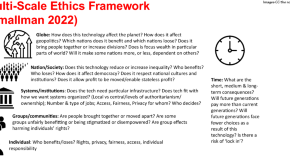
Collection
Innovation under Fire: The Rise of Ethics in Tech
- Submission status
- Closed
Equipping the world not only with smart products, but also with the dreams that late modern democracies are made of, the tech-industry has become central to the ways in which societies imagine and pursue desirable futures. In the last few years, however, technological innovation and its creators have come under fire. Amongst other public indictments, the tech-industry is held responsible for exploiting people’s data instead of protecting it, for operating in tax havens and thus not sharing its tremendous wealth with the public, for building monopolies that stifle competition, and for contributing to both unemployment and deteriorating working conditions. In the wake of such accusations, and the increasing public concern and protest about the many uncertainties that emerging technologies and scientific breakthroughs leave behind (e.g. Athena, Google workers protests, AI Now), we witness a shift among industries, policy-makers, and academics to emphasize the importance and operationalization of ethics in tech (e.g. AI and Data Ethics, Embedded Ethics, Value Sensitive and Privacy by Design, Responsible Innovation, etc.) While governments and international organizations launch councils and commissions to discuss how innovation can be ‘ethicalized’, humanized, governed, and regulated (e.g. IEEE, OECD, WEF, European Commission), companies are hiring in-house tech ethicists to solve the problems from within (e.g. Deep Minds, Google, Microsoft), often through manifestos, guidelines, and codes of conduct. In the academy, conferences and networks committed to advance ethics of science and technology are constantly popping up (e.g. Harvard University’s Carr Center for Human Rights, The Technical University of Munich’s Ethics of AI institute, Oxford University’s Digital Ethics Lab). So far, this dual trend of increasing public distrust in innovation and damage-controlling attempts to navigate and manage it through the institutionalization and performance of tech-ethics, has not been examined in depth by ethics, science, and technology research. Whereas scholarship in Science and Technology Studies (STS) has paid significant attention to the reconfiguration of scientific, technological, and normative orders in fields such as biotechnology and nanotechnology (e.g. Jasanoff 2004, 2005; Hilgartner; Miller, Hagendijk, 2015; Hurlbut 2017), new forms of innovation and their social ordering, particularly in the digital domain and driven within corporate settings, call for a comprehensive review of current developments within the ethics of science and technology. Here, the dual production of a crisis of innovation and new forms of tech-ethics to tackle it, is central for better understanding the governance of contemporary science and technology.As new and powerful actors are entering the scene of tech-ethics, critical examination of discourses, practices, and modes of governance is much needed. Such a project can help carve out differences and similarities to older regimes of science, technology, and society integration (e.g. Bioethics, Nanoethics, ELSI/A), and will set the stage for future research concerned with the study and operationalization of the ethics of innovation in the 21st century. In this proposed special issue we seek to advance the understanding of how novel developments in science and technology are inextricably linked to new forms of ethical expertise.
Editors
-
Kasper Hedegaard-Schiølin
Kasper Hedegaard-Schiølinis a Visiting Postdoctoral Fellow with the Program on Science, Technology & Society (STS) at the Harvard Kennedy School of Government. His hypothesis is that new technologies are accompanied by socio-technical imaginaries of human perfection, both at a societal and at an existential level. To substantiate this, the project will study the so-called “Fourth Industrial Revolution”, a notion recently coined by the World Economic Forum at their 2016 annual meeting in Davos, as an epochal designation of the present
-
Nina Frahm
link text Nina Frahm is a research associate and doctoral candidate at the Innovation, Society and Public Policy Research Group at the Munich Center for Technology in Society (MCTS), Technical University Munich. She was a 2018-2019 Visiting Research Fellow with the Program on Science, Technology and Society at the Harvard Kennedy School of Government.
Articles (6 in this collection)
-

-
How Neurotech Start-Ups Envision Ethical Futures: Demarcation, Deferral, Delegation
Authors
- Sophia Knopf
- Nina Frahm
- Sebastian M. Pfotenhauer
- Content type: Original Research/scholarship
- Open Access
- Published: 02 February 2023
- Article: 4
-
Multi Scale Ethics—Why We Need to Consider the Ethics of AI in Healthcare at Different Scales
Authors
- Melanie Smallman
- Content type: Original Research/Scholarship
- Open Access
- Published: 28 November 2022
- Article: 63

-
Tech Ethics Through Trust Auditing
Authors
- Matthew Grellette
- Content type: Original Research/Scholarship
- Open Access
- Published: 07 June 2022
- Article: 28
-
The Future Ethics of Artificial Intelligence in Medicine: Making Sense of Collaborative Models
Authors
- Torbjørn Gundersen
- Kristine Bærøe
- Content type: Original Research/Scholarship
- Open Access
- Published: 01 April 2022
- Article: 17
-
Modeling Ethics: Approaches to Data Creep in Higher Education
Authors
- Madisson Whitman
- Content type: Original Research/Scholarship
- Published: 18 November 2021
- Article: 71



